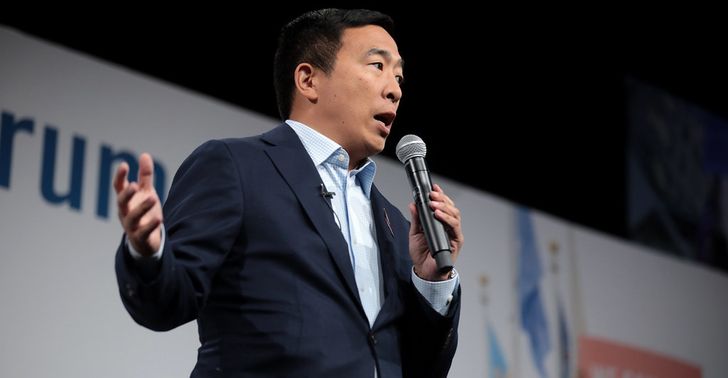Last week, Andrew Yang published an op-ed for The Washington Post. The op-ed, titled "We Asian Americans are not the virus, but we can be part of the cure," was Yang's response to the increase in racism against Asian Americans due to the COVID-19 pandemic. However, his op-ed ended up drawing widespread backlash from the Asian-American community, including prominent figures in the community such as Simu Liu and Viet Thanh Nguyen.
In the op-ed, Yang writes about a recent experience he had where he felt alienated and "self-conscious" about being Asian before touching on the uptick of racist incidents and hate crimes against Asian Americans due to the pandemic. While he doesn't get off to a bad start, much of the criticism comes from the later section in which he writes a call to action for Asian Americans. As he describes how Asian Americans should combat racism, he writes, "In general, negative responses don't work. I obviously think that being racist is not a good thing. But saying 'Don't be racist toward Asians' won't work." In urging some sort of positive response, Yang states that being "negative" and telling people not to be racist or discriminate is ineffective. While this might be partially true in the sense that many people will not listen and continue to be racist, calling out people's racism shouldn't be considered a "negative response." The fact is that this increase in racism needs to be brought to light, and Asian Americans shouldn't be silent about it. We have every right to defend ourselves and call out racism, and we have every right to tell people not to be racist. I don't think Yang intends to completely discourage people from defending themselves in this way, but he should understand that Asian Americans need to speak out against racism: Viet Thanh Nguyen stated in his response to the op-ed that "Asian Americans who don't understand that we have to be anti-racist at all times don't understand racism." Being "negative" about racism isn't a bad thing, and Asian Americans can and should oppose racism directly.
Yang then begins to elaborate on how Asian Americans should response to racism in a way that he thinks would work, as opposed to what he considers "negative responses." His idea of an appropriate and effective response his for Asian Americans to somehow prove that they're American. He gives the example of a UCLA basketball player who liked wearing her UCLA basketball gear because "the association reminded people that she was an American." Here, he implies that all Asian Americans should also perform similar acts of "reminding" people that they're American. This view is problematic because it places responsibility on Asian Americans for being stereotyped as "perpetual foreigners" rather than holding the actual perpetrators responsible.
The op-ed quickly starts going downhill from here. The next example Yang gives is Japanese Americans who served in the military during World War II "at the highest possible levels to demonstrate that they were Americans." This example is extremely flawed, not just in the same ways as the last one but also in that it actually disproves his point. While these Japanese Americans did serve in the U.S. military during WWII, we can't forget that WWII was also a time of extreme racism against Japanese Americans that ultimately led to the displacement of Japanese Americans to internment camps. The fact that there were Japanese Americans in the military didn't change that. It didn't keep Japanese Americans out of these camps, and it certainly didn't do anything to change the views of racist people or make Japanese Americans seem "more American" to the American public. This idea that Asian Americans need to "prove" that they are American has, historically, not worked.
In concluding his call to action, Yang writes, "We Asian Americans need to embrace and show our American-ness in ways we never have before. We need to step up, help our neighbors, donate gear, vote, wear red white and blue, volunteer, fund aid organizations, and do everything in our power to accelerate the end of this crisis. We should show without a shadow of a doubt that we are Americans who will do our part for our country in this time of need." While I understand why Yang would want to urge Asian Americans to contribute, these are things that everyone, Asian American or not, who has the means to do so should be doing (other than wearing red, white, and blue -- I don't think I need to say anything about why that won't work). Asian Americans shouldn't have to prove their "American-ness" to avoid racism -- maybe people shouldn't be racist in the first place. We're already American, and that should be a given. Obviously, it's not, but it's also not our responsibility to go out of our way to "show our 'American-ness.'" Doing so ignores the core issue of the perception of Asian Americans and validates the anti-Asian racism and the perpetual foreigner stereotype -- putting in all this effort just to prove ourselves will only imply that we weren't "American enough" before.
Ultimately, Asian Americans don't need to prove our "American-ness" because we're already American. Instead of trying to "prove" ourselves to racists, let's actually call them out for their racism and make sure they don't get away with being racist. Let's challenge the "perpetual foreigner" stereotype and the people who uphold it -- not by wearing red, white, and blue or a basketball uniform, but by already being American the way we are and holding racists responsible. We can educate people and combat racism without changing ourselves. We're not at fault for anti-Asian racism -- racists are. Asian Americans are American, and we shouldn't have to prove that to anyone.









































